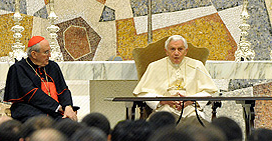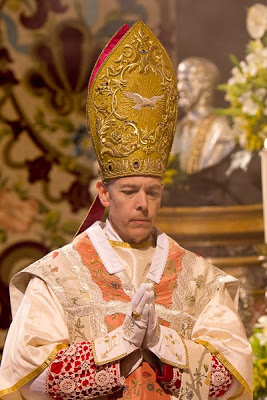Pave Benedikt snakket til prestestudenter i Roma

Forrige uke møtte pave Benedikt seminaristene i Roma, og vi kan lese om det på www.chiesa:
As in other years at the feast of Our Lady of Confidence, this time as well Benedict XVI went to the major Roman seminary to hold for the aspiring priests a «lectio divina.»
Pope Joseph Ratzinger spoke off the cuff, with just a page of notes in front of him, in addition to the biblical text he had chosen.
And when he speaks off the cuff, he unveils his thoughts in the most transparent and clear manner, as demonstrated by the literal transcription of his words, usually released one or two days later, revised and authorized by the author. …
Om arven vi har fått overlevert sa paven følgende:
… «Inheritance is a very important word in the Old Testament, where it is said to Abraham that his seed will be the heir of the land, and this has always been the promise for his people: you will have the land, you will be heirs of the land. In the New Testament this word becomes a word for us: we are heirs, not of a certain country, but of the land of God, of the future of God. Inheritance is a thing of the future, and thus this word says above all that as Christians we have the future: the future is ours, the future belongs to God. And thus, being Christians, we know that ours is the future and the tree of the Church is not a dying tree, but the tree that grows ever anew. We therefore have a reason not to allow ourselves to be disturbed – as Pope John said – by the prophets of disaster who say: the Church is a tree come from the mustard seed, grown over two millennia, now it has time behind it, now is the time in which it is dying. No. The Church is always renewed, is always reborn. The future is ours.
«Naturally, there is a false optimism and a false pessimism. A false pessimism that says: the time of Christianity is finished. No: it is beginning again! The false optimism was that after the Council, when the convents were closing, the seminaries were closing, and they were saying: but it’s nothing, everything’s fine . . . No! Everything is not fine. There are also grave, dangerous downfalls, and we must recognize with healthy realism that this is not all right, it is not all right when wrongful things are done. But also to be sure, at the same time, that if here and there the Church is dying because of the sins of men, because of their unbelief, at the same time it is being born anew. The future really does belong to God: this is the great certainty of our life, the great, true optimism that we know. The Church is the tree of God that lives forever and bears within itself eternity and the true inheritance: eternal life.”

 Tidligere denne uka åpnet parliamentet i London for «homofile» ekteskap. Engelske katolikker har reagert ganske kraftig på dette, bl.a. i denne artikkelen:
Tidligere denne uka åpnet parliamentet i London for «homofile» ekteskap. Engelske katolikker har reagert ganske kraftig på dette, bl.a. i denne artikkelen: 
